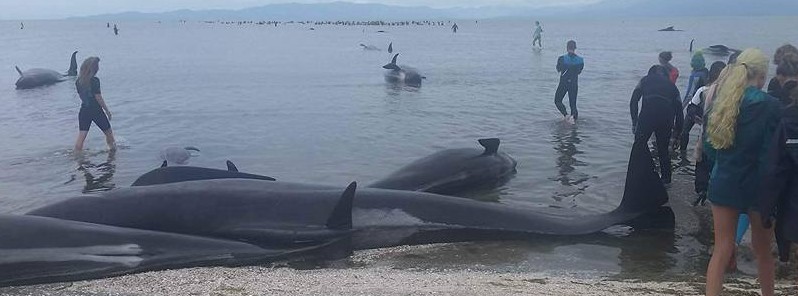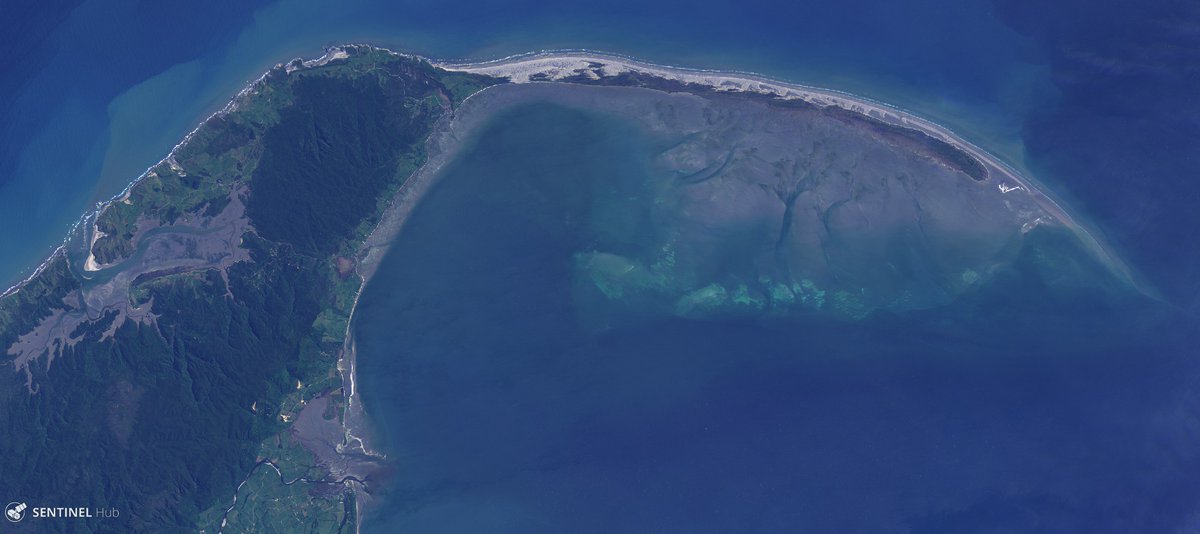Second-largest whale stranding event in New Zealand

416 pilot whales were found stranded at Farewell Spit in New Zealand's Golden Bay late Thursday, February 9, 2017. On Saturday, February 11, a new pod of 240 whales stranded on the beach, bringing the total number to 656 and making this the second-largest stranding event in New Zealand since the 1800's.
The Department of Conservation Golden Bay operations manager Andrew Lamason said an estimated 70% of the first pod of whales had died overnight. More than 100 had been refloated around high tide on Friday morning, but the whales began re-stranding before noon.
Friday's refloat had been partially successful with about 50 whales out swimming in the bay, but the remaining 80 whales had re-stranded on the beach.




Lamason said volunteers would keep the beached whales comfortable until dark. The situation would be reassessed early on Saturday morning, with another attempt at refloating any remaining stranded whales at high tide around lunchtime on Saturday.
Project Jonah, NZ's charity organization well known for their involvement in helping marine mammals, said that by the end of the day, there were over 400 volunteers and medics working to keep the 50 stranded whales still alive to stay cool, calm and comfortable. Another 50 whales were milling off shore in close proximity to their pod throughout the day.
Mass strandings regularly occur at Farewell Spit in Golden Bay, they said. This area is sometimes described as a whale trap because it has a long protruding coastline and gently sloping beaches which appears to make it difficult for whales to navigate away from with their sonar systems once they get close. In February 2015, 198 long finned pilot whales stranded there in the largest stranding in New Zealand for more than 15 years.
New Zealand has one of the highest rates of whale strandings in the world.
In 1918, 1 000 pilot whales stranded on the Chatham Islands and in 1985, about 450 stranded in Auckland.
Updates
February 11, 2017
According to the Associated Press, a new pod of 240 whales stranded at Farewell Spit on Saturday, February 11 just hours after weary volunteers managed to refloat a different group of whales following an earlier mass stranding.
Lamason said they are sure they're dealing with a new pod because they had tagged all the refloated whales from the first group and none of the new group had tags.
This brought the total number of stranded pilot whales to 656, making this the second-largest whale stranding event in the history of New Zealand.
About 335 of the whales are dead, 220 remain stranded, and 100 are back at sea.
ESA's Sentinel-2 took the following image of Farewell Spit on February 3, a week before the stranding.


Credit: ESA/Copernicus Sentinel-2
Featured image: Third-larges whale stranding in New Zealand – February 2017. Credit: Project Jonah

Причиной выбрасывания на берег морских животных является ранее неизвестное природное явление “Водоворот Невидимка”.
“Водоворот Невидимка” является продолжением “Водоворота с воронкой” образовавшимся при урагане.
В конце урагана воронка водоворота закрывается. Оказавшиеся при урагане в водовороте морские животные с головокружением, после урагана “Водоворот Невидимка” выбрасывает на берег.